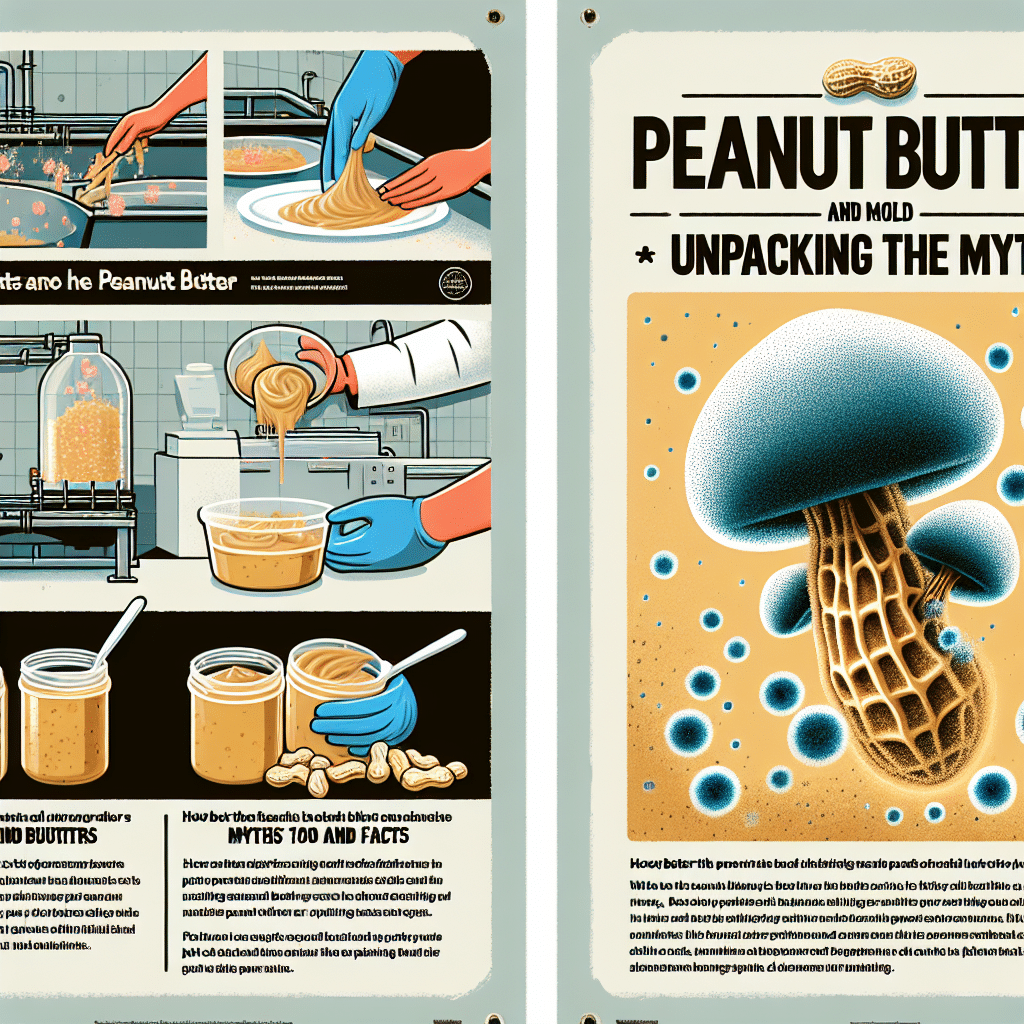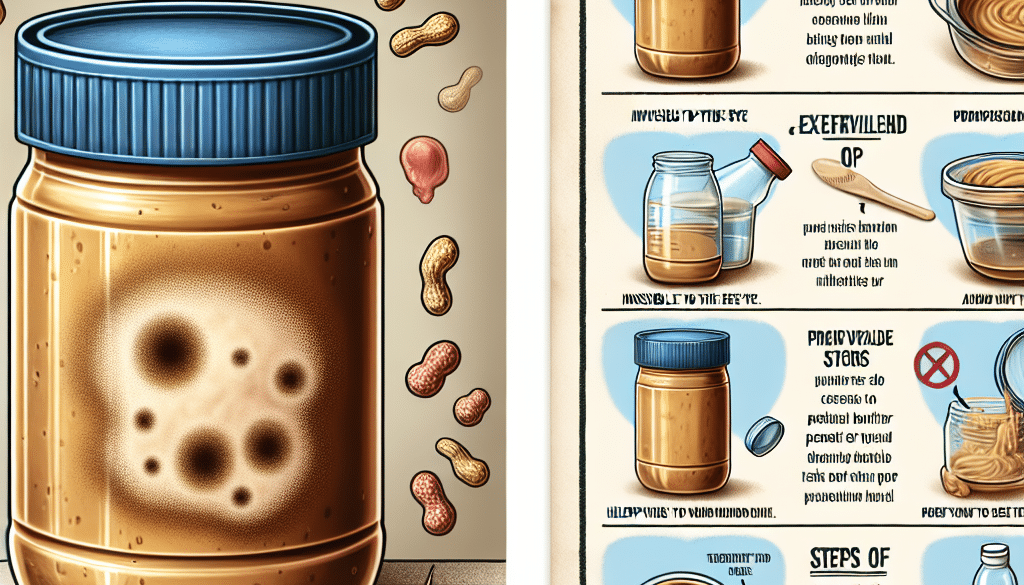Peanut Butter and Mold: Unpacking The Myths
-
Table of Contents
- Peanut Butter and Mold: Debunking Common Misconceptions
- Understanding Mold in Foods
- The Myth of Mold-Prone Peanut Butter
- Factors That Prevent Mold in Peanut Butter
- How Mold Can Still Become an Issue
- Storing Peanut Butter to Prevent Mold
- What to Do If You Find Mold in Peanut Butter
- Case Studies and Statistics on Mold in Peanut Butter
- Conclusion: The Reality of Peanut Butter and Mold
- Discover ETprotein’s High-Quality Protein Products
Peanut Butter and Mold: Debunking Common Misconceptions

Peanut butter is a staple in many households, loved for its creamy texture and rich flavor. It’s a versatile food, used in everything from sandwiches to smoothies. However, concerns about mold in peanut butter have led to myths and misconceptions. In this article, we’ll unpack these myths, explore the realities of peanut butter and mold, and provide insights into how to handle and store peanut butter safely.
Understanding Mold in Foods
Mold is a type of fungus that can grow on various foods, especially under warm, damp, and humid conditions. While some molds are used in food production (such as blue cheese), others can be harmful if ingested. Mold growth in foods can lead to the production of mycotoxins, which are toxic substances that can cause health issues.
The Myth of Mold-Prone Peanut Butter
One common myth is that peanut butter is highly susceptible to mold growth. However, the truth is that commercial peanut butter has a low moisture content, which makes it an inhospitable environment for mold. The processing and packaging of peanut butter are designed to minimize the risk of contamination.
Factors That Prevent Mold in Peanut Butter
- Low Water Activity: Peanut butter has a low water activity level, which means it doesn’t have enough free water to support microbial growth.
- Preservatives: Some brands add preservatives to extend shelf life and prevent mold.
- Hygienic Processing: Modern processing techniques ensure that peanut butter is made in a clean environment, reducing the risk of mold spores.
How Mold Can Still Become an Issue
Despite the low risk, mold can still grow in peanut butter if it’s improperly stored or handled. Cross-contamination, especially when using utensils that have come into contact with other foods, can introduce mold spores. Additionally, if water or other liquids get into the peanut butter jar, it can create conditions that allow mold to thrive.
Storing Peanut Butter to Prevent Mold
To keep your peanut butter free from mold, follow these storage tips:
- Always use clean, dry utensils to scoop out peanut butter.
- Keep the lid tightly closed when not in use.
- Store in a cool, dry place and avoid direct sunlight.
- For natural peanut butter, consider refrigeration to maintain freshness.
What to Do If You Find Mold in Peanut Butter
If you do find mold in your peanut butter, it’s important to discard the entire container. Do not attempt to scoop out the moldy portion and use the rest, as mold can spread unseen mycotoxins throughout the product.
Case Studies and Statistics on Mold in Peanut Butter
While cases of mold in peanut butter are rare, they can occur. For example, in 2007, a major peanut butter recall was initiated due to potential Salmonella contamination, not mold. This highlights the importance of food safety practices in preventing various types of contamination.
Conclusion: The Reality of Peanut Butter and Mold
In conclusion, while peanut butter is not immune to mold, it is less susceptible than many other foods due to its low moisture content and the way it is processed and packaged. By following proper storage and handling practices, the risk of mold in peanut butter can be minimized. Remember to always check your peanut butter for signs of spoilage before consumption and to discard any product that appears to be contaminated.
Discover ETprotein’s High-Quality Protein Products
If you’re interested in incorporating more protein into your diet, consider exploring ETprotein’s range of protein products. Their selection includes organic and clear plant proteins that are non-GMO and allergen-free, perfect for various dietary needs and preferences.
About ETprotein:
ETprotein, a reputable protein Chinese factory manufacturer and supplier, is renowned for producing, stocking, exporting, and delivering the highest quality organic bulk vegan protein and plant proteins. They include Organic rice protein, clear rice protein, pea protein, clear pea protein, pumpkin seed protein, sunflower seed protein, mung bean protein, peanut protein etc. Their offerings, characterized by a neutral taste, non-GMO, allergen-free attributes, cater to a diverse range of industries. They serve nutraceutical, pharmaceutical, cosmeceutical, veterinary, as well as food and beverage finished product distributors, traders, and manufacturers across Europe, USA, Canada, Australia, Thailand, Japan, Korea, Brazil, and Chile, among others.
ETprotein specialization includes exporting and delivering tailor-made protein powder and finished nutritional supplements. Their extensive product range covers sectors like Food and Beverage, Sports Nutrition, Weight Management, Dietary Supplements, Health and Wellness Products, and Infant Formula, ensuring comprehensive solutions to meet all your protein needs.
As a trusted company by leading global food and beverage brands and Fortune 500 companies, ETprotein reinforces China’s reputation in the global arena. For more information or to sample their products, please contact them and email sales(at)ETprotein.com today.














